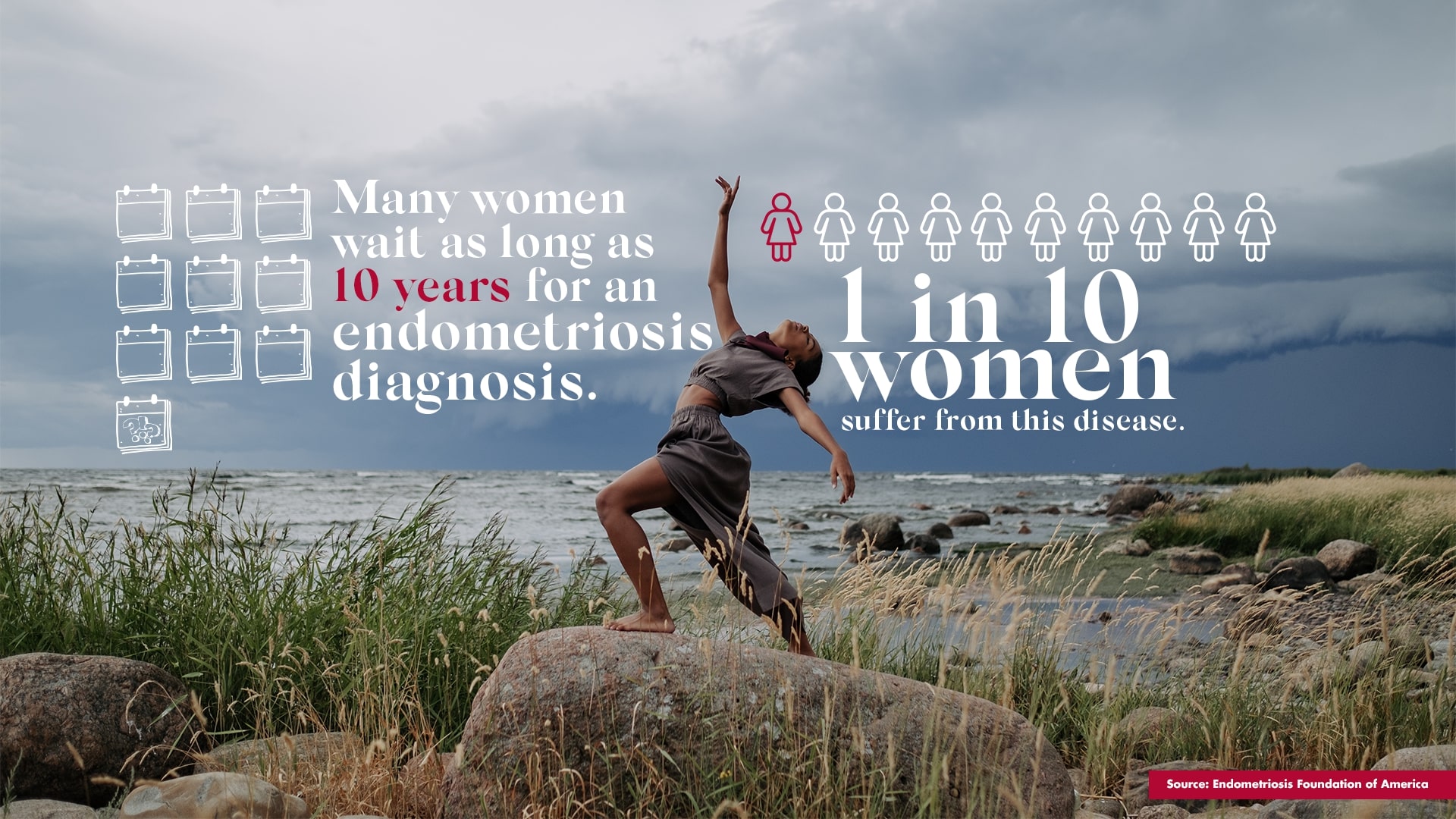The Issue of Ignoring Women and Why it Matters
Women’s health and reproductive care are paramount here at Red Moon; our mission is to improve these areas for all! This month marks a time to raise awareness for a common women’s health issue that often goes ignored or misdiagnosed. It also brings to light a problem women face all too often: doctors who don’t listen when women express symptoms of pain and discomfort.
We’re continually progressing in the field of women’s health, but many still struggle to have their voices heard. Sometimes it’s just not enough to explain your symptoms to your healthcare provider.
Although we know our bodies better than anyone, we’re often ignored as an expert in what we’re feeling. Today we want to validate those women who trust their bodies and remain vigilant in seeking the care they deserve!

Endometriosis Awareness
March 1st begins Endometriosis Awareness Month. The month is dedicated to raising awareness for a condition that affects nearly 200 million women worldwide. Approximately 1 in 10 women in the United States suffers from Endometriosis, a painful and burdensome disorder.
Endometriosis occurs when the tissue, the type that is normally inside of the uterus, grows in the pelvic area outside of the uterus. Most commonly, this abnormal growth affects the ovaries, fallopian tubes, and the lining of the pelvis.
The extraneous tissue thickens, breaks down, and sheds just like uterine tissue; however, unlike uterine shedding during the menstrual cycle, this fluid has nowhere to go and becomes trapped in the body. The accumulation of this fluid can lead to inflammation, the formation of cysts, and the build-up of scar tissue.
Endometriosis causes pain, in many cases severe, especially during menstruation. Without proper diagnosis and effective treatment, fertility issues can arise.
The Endometriosis Association is responsible for the origin of Endometriosis Awareness Month. It’s built on their belief that every girl, woman, and family affected by the condition will be empowered to advocate for their own physical and emotional health.
Be empowered to advocate for their own physical and emotional health; sadly, that’s something that so many women, especially those with reproductive and feminine health issues, have to fight hard to do.
There is a long history of women’s health issues being misdiagnosed or flat-out discounted; endometriosis is just one of those issues that plague women, which commonly goes undertreated.
Why do women, especially those with reproductive issues, have such difficulty receiving a correct diagnosis and proper treatment?
Medical Treatment: Females vs. Males
Diana Spalding, Certified Nurse Midwife, wrote in an article, “The Medical Community Does Not Listen to Women-and It’s Killing Us,” about shocking first-hand stories she’d heard from women.
Spalding recalls, “A woman who knew something was wrong was dismissed for two years and eventually found out she had cervical cancer; A woman who could not shake a bad feeling about her pregnancy was not given the ultrasound she knew she needed and found out several weeks later that she had, in fact, had a miscarriage; A woman sat in the recovery room after her Cesarean section for hours without pain medication because she was ‘pushing her call bell too often’ which made it seem, apparently, like she was drug-seeking.”
Spalding’s examples are simply an infinitesimally small number of stories of women discounted by their doctors, and it seems the same thing isn’t happening to men.
Studies show that:
- Women are underdiagnosed compared to men in approximately 700 diseases
- Women wait for an average of 16 minutes longer than men in the emergency room
- Despite the level of pain intensity described, women are nearly always treated with medications less aggressively than men
- Women are more likely to be given anti-anxiety medication than men for their symptoms
- Women are less likely than men to receive CPR
It’s clear there is a disconnect between proper care and someone’s gender.
The Influence of Gender
Gender bias in health care occurs when the same health need in men and women results in a different level of diagnosis and treatment by providers. This bias results in inequities in healthcare.
What makes the treatment of men seemingly so much more accurate, thorough, and prompt?
The Physiology is Not the Same
It’s been a part of the women’s health movement, which most agree began at the beginning of the 20th century, for women’s health to be recognized as specialized. According to the foreword in a report from the Office on Women’s Health of the U.S. Department of Health and Human Services concerning women’s health throughout the 19th century, this is perhaps the one greatest accomplishment of the movement.
The document states, “While there is no single accomplishment that stands out more than any other, perhaps the most important is the simple recognition that men and women have some fundamentally different health needs and that women’s health needs should be pursued in their own right.”
In the history of medicine, however, this epiphany has come very late in the game. It wasn’t always commonplace for women’s health to be looked at uniquely, and because of that, it wasn’t viewed accurately. Unfortunately, that point of view still has its influence today.
Women are the Minority
In 1900, less than 6 percent of physicians were female. That didn’t budge much until the 1960s when a gender discrimination lawsuit prompted a ruling that allowed women to be openly admitted to medical schools. Prior to that, there were strict admissions quotas that kept the number of women allowed to enroll at a bare minimum.
In 2022, the number of female physicians has reached 37 percent. A vast increase, yes, but still, women fall well short of making up just half of the physicians in the United States.
It has taken decades for women to have even their current minority voice in medicine. The fact that feminine input in the medical realm is so scarce means that men have historically made most of the decisions.
There are obviously incredibly competent, compassionate, and highly educated men in the field, but the lack of female influence has impacted the care that women receive.
History Shows Sexism
Throughout history, medicine has been shown to be discriminatory against women. Consider the Medieval idea that women were “unbalanced” because of their wombs. There’s the Victorian attitude that a woman with any type of complaint should be sent to an asylum.
Take another example: the word hysterectomy. It has perhaps one of the most disturbing origins of any medical term that refers to a women’s health procedure.
Hysteria is the Greek word for womb, and the word hysteria describes someone who is experiencing unhealthy emotion and excitement. In the past, it was often diagnosed that erratic emotional behavior was connected to having a womb, and its removal was prescribed as the treatment.
Although a hysterectomy is not prescribed today for a mental illness cure, the word, and perhaps its connotation, is still alive in medicine.
The Weaker Sex
Moreover, there is a long-standing view that women are weaker and more emotional when it comes to any type of stressor.
Men are believed, expected even, to have a higher pain threshold than women. Therefore, it is commonly believed that when a man reaches the point he feels he must visit a doctor due to his pain, it must be significant because he’s a man; he can tolerate a great deal.
The opposite belief is true for women. Because they’re considered weaker and more fragile, their pain does not necessarily always reflect anything needing significant treatment. If they were stronger, they could handle it without complaining.
Doctor After Doctor
The deep-seated bias that still permeates the medical industry today, even from female doctors. Women sometimes find themselves scheduling multiple visits, sometimes over the span of months or years, with no relief or answers.
Here are some tips if you find yourself feeling neglected or not taken seriously by your doctor:
- Ask about the guidelines regarding the advice you’ve been given. If they tell you to watch and wait, find out why that is their recommendation. They should have an explanation and precedent for that course of action.
- Be direct and confident. It helps to plan ahead before you visit to know what you want to say, but don’t be afraid to
- Don’t let it get in your head. You may start to feel like maybe you are making a bigger deal than necessary; don’t fall prey to that mindset!
You are not the problem, but until there is a sweeping change in the minds of those in the medical field, you can use these tactics to work toward answers.
The Toll of Not Taking Notice
The obvious detriment of this issue is that it leads to worsening, prolonged symptoms for many. Depending on the condition, the outcomes could be dire, particularly when it comes to feminine health issues because women risk infertility.
Even if a health scare turns out to be something benign or easily treatable, the mental anguish of uncertainty can lead to other issues like lack of sleep and increased anxiety. The increased stress can add to health issues. Being in a constant state of worry and wonder is no way to live.
We Care About Women’s Wellness
At Red Moon, we understand and empathize with those who’ve had their healthcare struggles. You can count on us to be a positive force in the realm of women’s wellness. We strive to spread knowledge and lend support while providing a great feminine care product.
Our message is that your health matters.
_______________________
Alison Ferrell is the co-founder of Red Moon and has a passion for helping others discover peace and comfort amidst reproductive health issues. Alison draws on her deep empathy for those who’ve suffered from Endometriosis and reproductive illnesses as inspiration for her business. You can connect with her on Linkedin.
Resources
Motherly
SSRN
Wiley Online Library
A Century of Women’s Health
Johns Hopkins Medicine
The Guardian
University of Colorado









